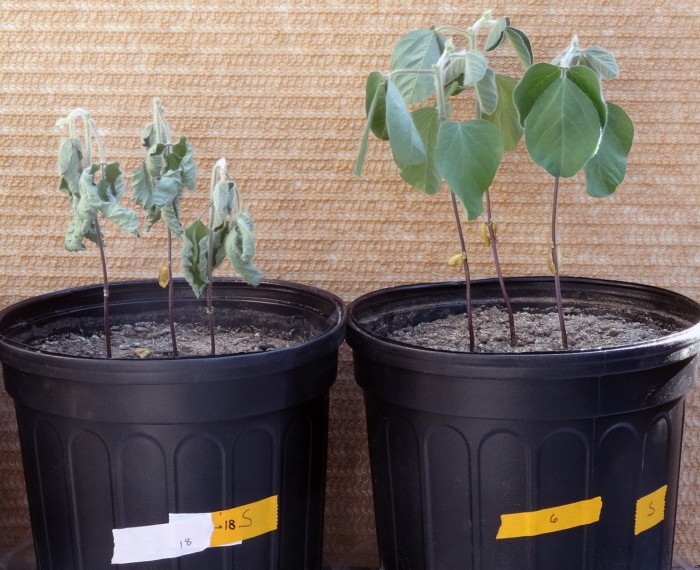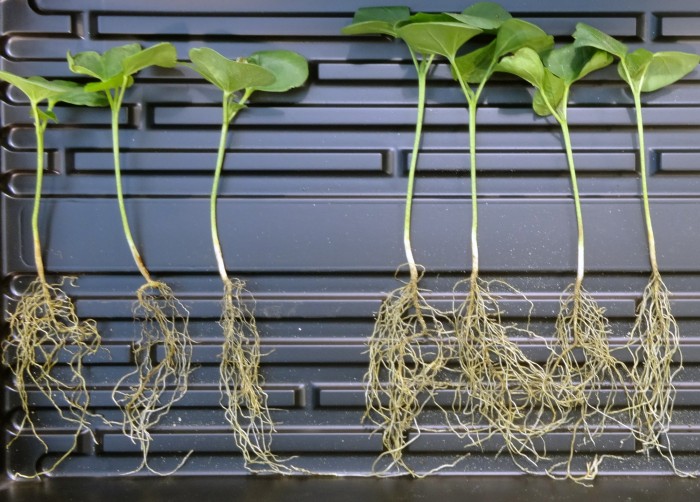Startup Bets Its Magic Touch on Seeds Can Boost Crop Yields
Might the communities of microörganisms living in healthy plants hold the keys to dramatically increasing crop yields? A new venture-backed company is betting yes.
Indigo, a Cambridge, Massachusetts-based startup, is developing microbe-based crop treatments identified through the study of the beneficial bacteria and fungi—collectively known as the microbiome—that naturally live in and around plants. Formerly known as Symbiota, Indigo announced Thursday that this year it would release its first two products, microbe-based seed coatings for two undisclosed crops.
Using beneficial microbes to bolster crops is not a new idea. Major seed companies like Monsanto and Syngenta have released seed treatments that contain microbes and are investing in related research and development. Indigo is unique in its focus on microbes that live in the plant tissue, as opposed to in the soil near the plant’s roots, says the company’s CEO David Perry. Scientists have only recently begun to realize the extent of these communities and their importance to plant health.

So far Indigo’s scientists have field-tested its “beneficial microbes” on corn, wheat, cotton, soy, barley, canola, various beans, chickpeas, and sorghum. Perry says that based on field test results the company expects its first products to enable a 10 percent yield improvement or greater over untreated crops. He says Indigo’s crops also won’t need as much pesticides or fertilizer to thrive.
Many experts argue that at its current growth rate, agricultural productivity will not keep up with demand for crops, which is expected to increase substantially between now and 2050 thanks to many factors including population growth, greater food consumption due to increased wealth, and increased use of biofuels. Improving the yields of multiple crops by 10 percent would be “like jumping forward a decade,” says Perry, since global agricultural productivity is increasing by roughly 1 percent annually.
Intensifying competition for land and other resources means improving yields will be crucial. Much of the improvement made over the past several decades has been thanks to the use of pesticides, herbicides, and chemical fertilizers. Indigo’s founders set out to find another way, and may have found one in the microbiome.
Just like the human microbiome, plant microbiomes have evolved to perform beneficial and even vital functions for their hosts. In one well-known example, bacteria that live within nodules on the roots of legumes convert nitrogen into a usable form for the plants. Microbes that live in the roots or leaves may do things like protect the plant against specific pests or bolster its ability to survive harsh environmental conditions. Perry says modern seeds have fewer microbes and less diversity in strains than their wild counterparts or even older seeds. One hypothesis is that modern agriculture practices, in particular the use of fungicides, has altered microbiomes of crops in detrimental ways.

By sequencing the genomes of organisms found in thousands of plant samples taken from all over the world, Indigo’s scientists have created a database of more than 40,000 individual microbes. Using machine-learning algorithms, they identify specific organisms likely to be beneficial in certain conditions—for example, microbes that might make a particular crop more tolerant of dry conditions. Promising candidates advance to greenhouse testing and eventually field testing.
The idea behind Indigo is reflective of a fairly recent “paradigm shift in thinking” about the plant microbiome that’s similar to what’s been occurring in medicine, where only in the past several years have scientists realized the importance of the microbiome to human health, says Betsy Arnold, a professor of plant sciences and ecology and evolutionary biology at the University of Arizona. Scientists have been studying microbes beneficial to plants for decades, says Arnold, an academic collaborator with Indigo. But a lot of that work was focused on individual plant-microbe interactions, and researchers are now piecing together that knowledge.
The unraveling of the plant microbiome’s function in health and productivity is just getting started, says Perry. “We probably know 1 or 2 percent of what we’re going to know in five or 10 years.”
Keep Reading
Most Popular
Large language models can do jaw-dropping things. But nobody knows exactly why.
And that's a problem. Figuring it out is one of the biggest scientific puzzles of our time and a crucial step towards controlling more powerful future models.
The problem with plug-in hybrids? Their drivers.
Plug-in hybrids are often sold as a transition to EVs, but new data from Europe shows we’re still underestimating the emissions they produce.
Google DeepMind’s new generative model makes Super Mario–like games from scratch
Genie learns how to control games by watching hours and hours of video. It could help train next-gen robots too.
How scientists traced a mysterious covid case back to six toilets
When wastewater surveillance turns into a hunt for a single infected individual, the ethics get tricky.
Stay connected
Get the latest updates from
MIT Technology Review
Discover special offers, top stories, upcoming events, and more.